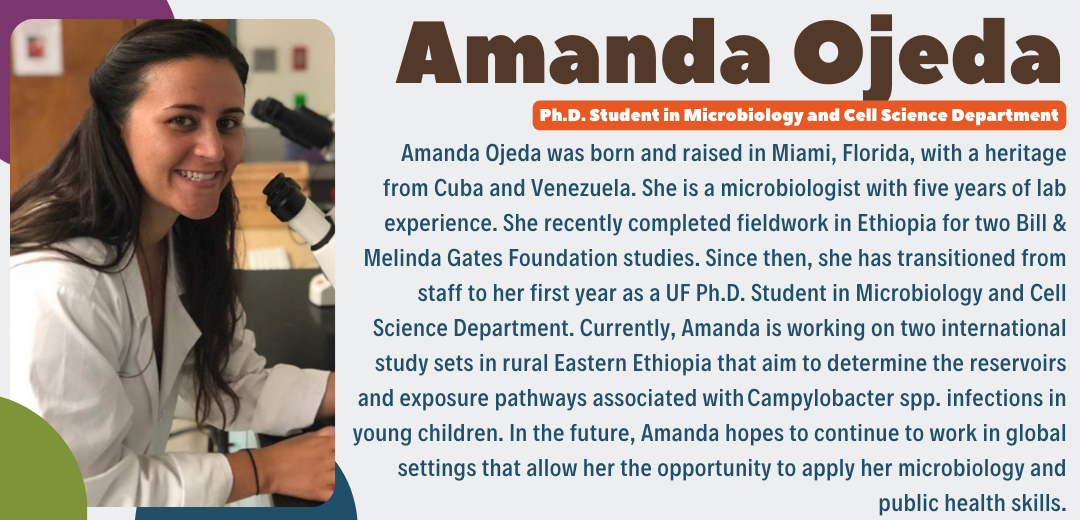Amanda Ojeda was born and raised in Miami, Florida, with a heritage from Cuba and Venezuela. She is a microbiologist with five years of lab experience, including working in the food safety industry (Merieux NutriSciences) and academia as the Microbiology and Cell Science Teaching Lab Manager. During her MPH, she sought research experience, specifically working in an international setting to combine her two passions: Microbiology and Public Health.

Amanda joined the Havelaar lab in February 2020, where she served as the Lab Manager for two projects set in rural Eastern Ethiopia: Campylobacter Genomics and Environmental Enteric Dysfunction (CAGED) and EXposure Assessment of CAMpylobacter Infection in Rural Ethiopia (EXCAM), which are a part of the Feed the Future Innovation Lab for Livestock Systems.
CAGED strives to determine the reservoirs and pathways associated with Campylobacter infections in young children. These bacterial infections impact child health by impairing the gut microbiome, nutrition, and growth. Current research has indicated that the high prevalence of Campylobacter in early childhood is associated with adverse child health outcomes such as stunting and environmental enteric dysfunction.
The Bill & Melinda Gates Foundation funded this study. It is progressing into the longitudinal phase, aiming to address three objectives:
- Assess the prevalence, species composition, and genomic diversity of thermotolerant and non-thermotolerant Campylobacter species in young children, adults, livestock, and other reservoirs in rural eastern Ethiopia.
- Determine the attribution of Campylobacter infections in young children to humans, livestock, and environmental reservoirs based on the genetic population of Campylobacter species.
- Assess the associations among the presence of Campylobacter species, gut microflora, and adverse child health outcomes such as stunting and environmental enteric dysfunction
EXCAM is a Bill & Melinda Gates Foundation-funded study that will run congruently with CAGED in rural Eastern Ethiopia. Study participants in this cross-sectional study will be recruited from CAGED participants at the time of enrollment. The study aims to examine Campylobacter exposure pathways and infection among infants systemically. Extensive behavioral observations, contact sampling, and Campylobacter detection methods will be utilized to quantify exposure and risk assessment between Campylobacter and various potential routes of exposure.
Upon the completion of fieldwork in July 2022, Amanda transitioned from staff to a graduate student role at the University of Florida and started her first year as a Ph.D. Student in Microbiology and Cell Science Department.
My future aspiration is to continue to work in global settings that allow me the opportunity to apply my microbiology and public health skill sets to improve maternal and child health by exploring the gut microbiome.
Learn more about her research here:
https://animal.ifas.ufl.edu/epi/our-research/ongoing-projects/caged-project/
https://animal.ifas.ufl.edu/epi/our-research/ongoing-projects/excam-project/
